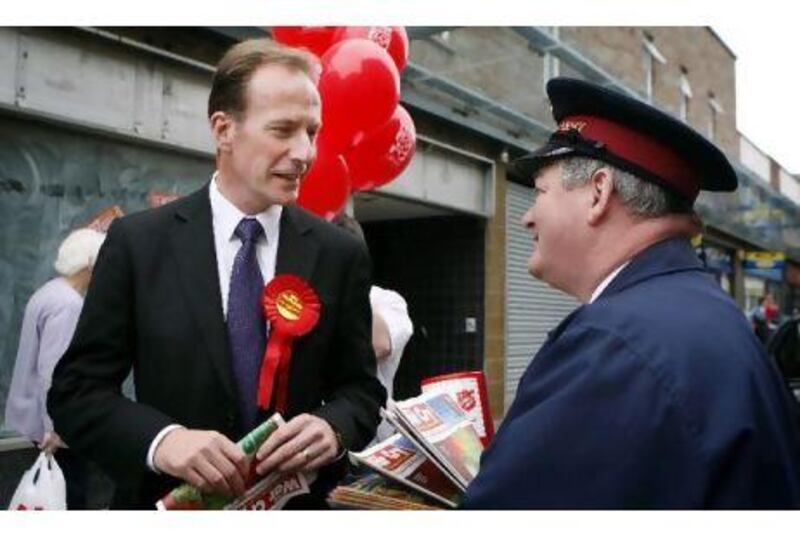LONDON // At any other time, a by-election in the outer regions of Glasgow would have commanded no more than a footnote in the annals of British politics.
But tomorrow's vote in the unprepossessing, former shipbuilding enclave of Inverclyde has taken on a significance that far outweighs its parliamentary merit.
It has been shaping up as a major clash between the Labour Party, for so long the overwhelmingly dominant force in Scottish politics, and the resurgent Scottish Nationalists (SNP), who want to fundamentally redraw the political map of Great Britain. At last year's general election, and despite sustaining heavy losses throughout the rest of Britain, Labour secured 41 of the 59 parliamentary seats north of the border.
But in last month's elections to the quasi-autonomous Scottish parliament, it was the SNP, with their promise of a referendum on independence from the rest of the UK within four years, who romped to victory. The results humiliated Labour candidates in hitherto unassailable strongholds.
Tomorrow's vote is the result of the death this year of David Cairns, a popular Labour MP and former minister who held the seat at the 2010 general election with a majority of more than 14,000.
It should be a cakewalk for Labour but during last month's Scottish assembly elections, the party's candidate in the area scraped home ahead of the SNP challenger with a majority of slightly more than 500.
"We know we have to win and win well," a Labour Party activist said. "Last month's elections were an unparalleled disaster for us in Scotland and were certainly not good for Ed Miliband's leadership of the party. It is vital for us that we show on Thursday that, when it comes to national parliamentary elections, we can still hold our own in Scotland."
The result will make little difference to the parliamentary arithmetic in Westminster: were the SNP to pull off the unlikeliest of victories, they would still have only seven MPs in the House of Commons.
But a defeat for Labour could have repercussions likely to shake the very foundations of the party.
Mr Miliband, who was elected last autumn as leader, has been the subject of increasing criticism from within his own party as Labour have failed to make advances, even though the Conservative-Liberal Democrat coalition government has lost support because of its spending cuts, including the loss of thousands of public sector jobs.
Last week, Mr Miliband hit the campaign trail in Inverclyde, describing the government's cuts as "reckless" and promising policies to help to overcome the area's high unemployment.
But at the weekend, he also acknowledged that his party was in trouble, saying that the Labour leadership had lost touch both with its own members and the public. In a speech to the party's national policy forum, Mr Miliband said that Labour "can only win if we change" and that power would not "come automatically".
He told delegates at the gathering: "A party created by working people, for working people, lost touch with them.
"Old Labour forgot about the public. New Labour forgot about the party. And, by the time we left office, we had lost touch with both."
In Inverclyde, the SNP are making hay with such admissions, representing themselves as the true voice of the Scottish people by promising to create jobs via a new enterprise zone.
Labour knows it will not command a 14,000-vote majority this time. But it also knows that a dramatic reduction in the figure, let alone a by-election defeat, would set party nerves jangling afresh across the country and pose further questions about the party's direction under Mr Miliband.
The Conservatives and Liberal Democrats, meanwhile, appear to have thrown in the towel. Though both are fielding candidates, they know they are so far behind Labour and the SNP that the prime minister, David Cameron, did not even bother to visit the constituency when he was in Scotland at the weekend.
Unfortunately for all the parties, the electorate does not seem that bothered by the whole affair either. The Caledonian Mercury observed: "The political parties are trying hard to engage the public's attention but, after such a momentous Scottish election just a month ago, even they are finding it hard to generate any enthusiasm for the contest."
The political pundits have Labour as odds-on favourite to retain the seat. If, by the early hours of Friday morning, the party has not, it will be very bad news indeed for Mr Miliband and for the future of a not-so-United Kingdom.






